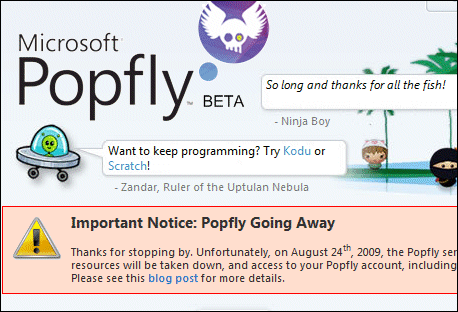I am not sure what goals Microsoft had for Popfly – or whether the company itself knew them – but apparently they were not met; a week ago the team announced the closure of the service, with just one month’s notice:
Unfortunately, on August 24, 2009 the Popfly service will be discontinued and all sites, references, and resources will be taken down. At that time, your access to your Popfly account, including any games and mashups that you have created, will be discontinued.

If this is a sign of a new clarity of focus at Microsoft it may even be good news, but not for those who invested time and effort in creating Popfly content.
Popfly had several aspects. It was a tool for creating mash-ups, web applications that combine data from several Internet sources; it was a game creator; it was a cloud-based IDE; and it was a visual programming tool. It was the last that interested me most. True visual programming means that program logic as well as user interface is created visually. It has never really hit the mainstream, though it is an idea that will not go away. A recent example is found in Expression Blend 3, another Microsoft product, which allow designers to add simple logic to Silverlight or Windows Presentation Foundation applications without writing code.
One day, most programming may be done this way; but not with Popfly, despite its potential and promise.
The other reflection on this modern form of software abandonment is how it highlights a risk inherent in cloud computing: what happens when your platform is removed. Software abandonment is nothing new, and most of us will recall a favourite word processor, mind mapping tool, database manager or some other utility which was chopped. In the old world though, you could still use the software, at least until an operating system upgrade came along and rendered it useless. Even that can often be overcome, thanks to virtualisation.
Not so with cloud computing. When the Popfly service closes, you simply lose access to all your work – though informally the team has stepped in with a downloader, so all is not lost.
Technically the same thing could happen to Google Apps, Salesforce.com, Windows Azure, Amazon web services and the rest, though the chance of these large concerns with millions of users (Azure aside) closing suddenly is tiny. The death of Popfly is nevertheless a warning: if your cloud computing service is either delivered by a small concern, or is of small concern to a large concern, the risks of data and service loss are very real.
Seems like most people just used it for creating rubbish games.
@George true, and emphasising the gaming aspect so strongly was a mistake in my view.
Tim
You are right that service going out of business is one of the risks when you use cloud services (there are others like privacy, connectivity etc).
Though I guess in Popfly case it was a known risk to begin with since popfly was a beta product and Microsoft has a history of killing beta stuff (remember Vista’s filesystem promise..)
Just in case you did not already notice it for yourself. Microsoft’s Ben Anderson has just announced that the actual Popfly game engine – without the online parts – was now released under Ms-PL license at Codeplex.
You can find his post here:
http://blogs.msdn.com/jasonz/archive/2009/08/27/popfly-game-engine-source-code-released.aspx